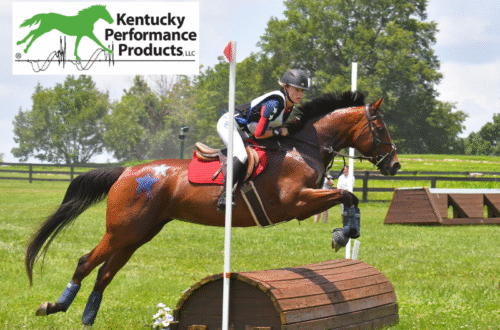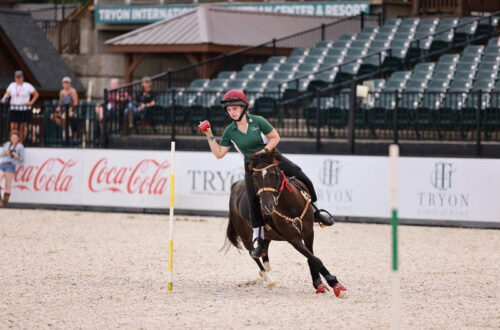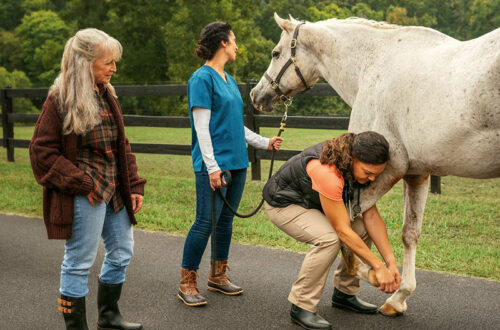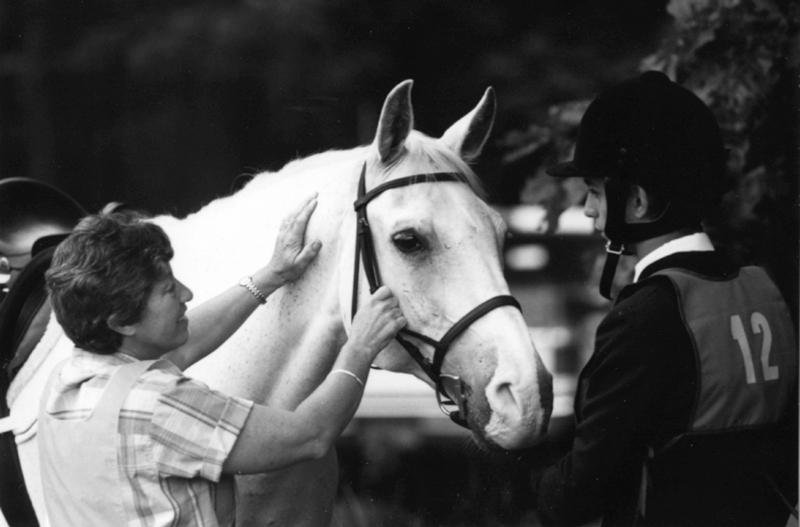
70 Years Strong: The United States Pony Clubs’ Impact on the Horse World
October 31, 2024 (Lexington, KY) — Over the past seven decades, the United States Pony Clubs (USPC) has served more than 175,000 members and counting. For many, Pony Club is the start of lifelong involvement with horses. But the impact of the United States Pony Clubs over 70 years extends far beyond the barn. In addition to horse care and riding, the Pony Club program teaches important life skills and values, including teamwork, leadership, service, stewardship, and dedication. Even more than that, it is a passion and a way of life for anyone who has been involved.
Officially founded on February 24, 1954, to teach safe riding and the proper care of horses, USPC is celebrating 70 years of equestrian education in 2024. Over that time, the impact of USPC on the horse world is impressive. Pony Club has provided thousands of equestrians with a solid foundation in horsemanship, including numerous Olympians who got their start through Pony Club. One of those Olympians is David O’Connor, who represented the United States in international competition for 30 years and earned an Individual Eventing Gold medal at the 2000 Sydney Olympic Games.
“The Pony Club was a great start for me as a not-wealthy kid who did not live on the show circuit,” he says. “When you think about the Pony Club’s involvement since the 1950s, you see an organization that was founded on filling a need: the need for young people of all walks of life to learn the lessons necessary to respect, ride, and take care of horses as individuals and as a species. … The impact for over seven decades has been enormous as society has changed, the competitive world of horses has changed, but the basic needs and responsibilities have not changed for the horses themselves. I know of few other total organizations that have been as influential as the Pony Club on the development of young people, using the horse to teach the life skills that are needed as they become adults.”
Educating Equestrians
When it comes to educating equestrians, Pony Club quite literally set the standards and wrote the book. Since the mid-1960s, USPC has developed and issued Standards of Proficiency for riders at all levels and across disciplines, written a handbook and three in-depth manuals on horse care and management, formalized instructor training with a network of National Examiners (experts on the USPC Standards), and created standardized testings (aka, certifications, and once known as ratings).
“Through innovation and a commitment to the equine industry, USPC developed a curriculum that strategically develops a rider to be secure and safe in any discipline with outstanding horse management skills,” explains Asia Thayer, a USPC National Examiner and an instructor in Dressage and Eventing. “This stepwise curriculum became the foundation for the USPC Standards of Proficiency (SOP).”
The 1990s saw the publication of the USPC Manuals of Horsemanship, which are essential reading for every Pony Club member and an important resource for anybody who wants to learn more about horse care and riding. They quickly became regarded as standard reference texts in the horse industry and continue to serve as a classic guide to horsemanship at all levels.
Pony Club is also developing the next generation of trainers and instructors. The influence of the USPC’s educational program is a living legacy as members and alumni go on to instruct others. Teaching and helping others has always been an important part of Pony Club. While it’s impossible to determine just how many equestrians have been students of the numerous USPC members and alumni, it has to be an impressive amount.
“Unlike many other organizations, Pony Club also teaches people how to teach,” says alum Katy Barglow, H-A, a National Examiner who is also an FEI trainer and USEF “S” judge in Dressage, in addition to her career as a biotech executive and scientist. “This is essential for future horse professionals, but also builds life skills for everyone else. I learned through Pony Club certifications and rallies the communication skills and confidence that allowed me to successfully defend my PhD thesis and launch my biotech career and know of many others, in the horse industry and outside, with similar stories.”
Historically, USPC served as a youth organization for decades. However, membership officially opened to all ages in 2015, and over the years USPC has developed thousands of equestrians. Today’s Pony Club program offers equestrian education to members of all ages and experience levels who can enjoy all USPC has to offer. Families and friends can learn and participate together, and beginning or returning adult riders can benefit from the curriculum. The program continues to grow and offer new opportunities, such as the Member Achievement Program and virtual competitions, in addition to the USPC Festival, USPC Convention, regional events, and more. The goal is that USPC will continue to reach new members, including more adults, and create an ever-expanding impact on horse lovers around the country.
Leading in Safety
One of USPC’s most critical impacts has been the research and development of rider helmet safety standards and the continuous promotion of helmet usage. In the 1950s, riding headgear of the day was the velvet-covered hunt cap, which was little more than a plastic shell with no harness or retention system to keep it on the wearer’s head.
With a focus on safety, USPC became the driving force behind the development of helmet safety testing and standards during the 1970s and 1980s. This research was fundamental in defining helmet design and safety as we know it today. In 1990, USPC became the first equestrian organization to require the use of the new ASTM/SEI-approved helmets in all activities. Other equestrian groups followed suit, as did non-equestrian sports.
Pony Club has continued to keep up with advancements in safety, rider health care, and scientific technology of safety apparel. By 2019, USPC began requiring members to wear body protection when jumping solid obstacles. Through USPC’s Safety Committee, advances in safety awareness, training, and protection continue to evolve.
70 Years of Service from the United States Pony Clubs Makes Impact
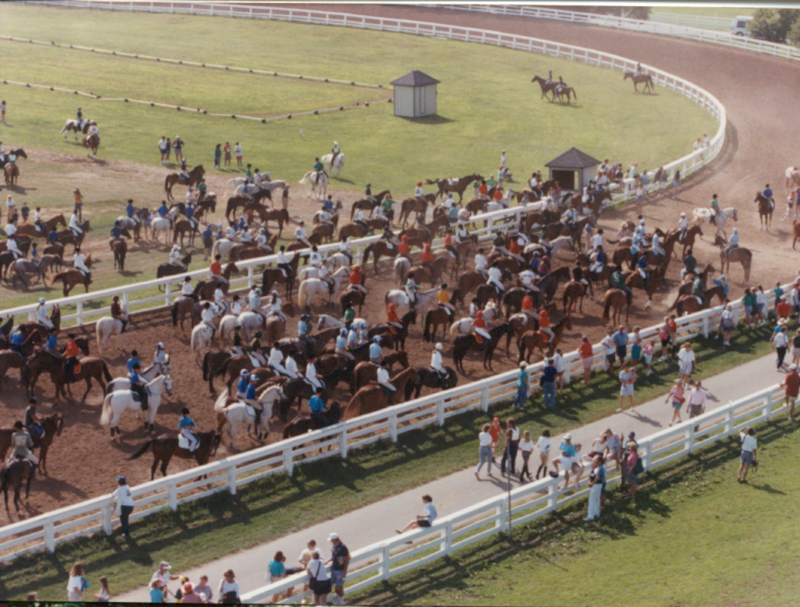
USPC’s core values also include respect for the land through conservation, and an emphasis on service to others through teamwork and volunteerism.
In the mid-1990s, alarmed by the steady decline in open land for riding and horsekeeping and what that could mean for the future for all equestrians, three USPC members formed a group called EqueServe, which later became the Equine Land Conservation Resource (ELCR). ELCR is known for its education and support of equestrians working to preserve land access.
Service is another cornerstone. Pony Club has always been powered by volunteers, and the volunteer spirit remains a big part of the organization. Clubs/centers, regions, and USPC national events are always in need of volunteers, and dedicated members and alumni are happy to give back at the club/center, regional, and national level. There are also many Pony Club parents who continue to volunteer long after their children have grown up! USPC participants also bring this spirit of volunteerism into other areas of the horse world.
“These legions of volunteers have helped guide Pony Club members to strive for excellence while learning and having fun,” says former USPC President and lifelong volunteer Ben Duke. “The result is that the American horse industry benefits from the experience, knowledge, and enthusiasm of countless Pony Club graduates.”
Thayer agrees with the far-reaching impact. “As a professional equestrian competitor and instructor, I am astonished to see my USPC students’ positive impact on the equine industry and world,” she shares. “They’ve moved on to be international equestrian competitors, doctors, nurses, veterinarians, police officers, public health experts, lawyers, and humanitarians. You begin to see how the USPC’s education and instillment of leadership, self-confidence, and professionalism reaches far beyond the equine industry.”
As we celebrate Pony Club’s 70th year in 2024 and look ahead to the future, we honor the many members, volunteers, and leaders who have been part of USPC and who have left their own impact on the horse community and the world.
About The United States Pony Clubs, Inc. — The United States Pony Clubs, Inc. (USPC or Pony Club) is a 501(c)(3) nonprofit educational organization that builds the foundation of teamwork and sportsmanship through riding, mounted sports, and care of horses and ponies, while developing and enhancing leadership, confidence, responsibility, and a sense of community in its youth and adult members. USPC is proud to offer instruction and competitive opportunities in 11 competitive disciplines through hundreds of clubs and centers across the United States. USPC’s educational standards continue to be instrumental in curriculum development for schools, universities, equestrian professionals, and organizations across the United States. Many of the nation’s top equestrians, including Olympic team members, as well as successful business professionals and leaders in a variety of fields, have roots in Pony Club. For more information, please visit www.ponyclub.org.



